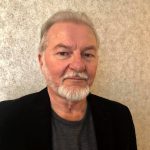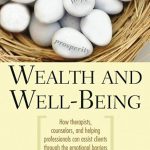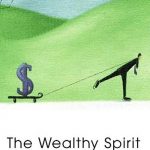Sam Beasley is a millionaire. Thirty years ago he was homeless. How did he take his life from one extreme to the other? I asked him to tell me his story.

“You’re a successful businessman today – you own commercial real estate and several businesses,” I began. “I can’t imagine you ever being on the skids. How did you ever end up being homeless? What happened?”
“I got divorced, I lost my business, and I got depressed,” Sam replied. “I just spiraled downward. I turned to alcohol and drugs to ease my pain, but they just made my depression worse. It finally got to the point that I just couldn’t take care of myself. Depressed people often find even basic self-care impossible and that’s where I was – down for the count. I crashed on friends’ sofas until I finally wore out my welcome and didn’t have anywhere else to go.”
“Did you sleep in your car?”
“I didn’t have a car,” Sam answered. “I started sleeping in garages, since I didn’t want to sleep outside. That was my lowest point.”
“What did you do?”
“I reached out for help and found a support group,” Sam responded. “I got better advice from them than from anyone else in my life. They helped me pull up my self-esteem. The told me to get a job, which I did. They told me to buy groceries and eat healthy, so I did. I just did what they told me to do – because clearly my best thinking had gotten me nowhere.
“I didn’t realize at the time how depressed I was. Losing my marriage was bad enough, but to lose my business on top of that was just too much. Business setbacks are particularly difficult for men because we get so much of our identity and self-respect from work and making money. I look back now and I can see that I was depressed. And of course, the booze and drugs just made it worse.”
“Sounds like hell.”
“It was,” Sam nodded. “I vowed I would never go back there again. Through the help of my support group, I was able to get stable. The job I got came with a truck, so I had wheels again. I was able to become self-supporting and do the basics in terms of taking care of myself. I returned to college. Eventually I remarried. I finished school and got a better job doing work I loved.
“But then I discovered credit. I knew nothing about credit cards and really didn’t understand how they worked. I’m a smart guy, but I’d never had any exposure or experience to teach me about the responsible use of credit cards.
“I was still rebuilding my life and so I started to use credit to speed the process along. I got in over my head. It got to the point that I couldn’t cover my expenses. In short, I had put myself at risk again. Thank God, this time I didn’t have to go so low.”
“What did you do to get out of hock?”
“This time I knew to ask for help sooner,” Sam replied. “I asked people in my support group for their advice. ‘How do you not incur debt?’ I asked them. It sounds kind of silly, I guess, telling the story now. But really, I didn’t have a clue how to live life without using credit.
“Then I began to ask other people – folks outside my support group. I watched for people who looked like they had money and set out to learn from them. I was willing to ask for advice. It was awkward in the beginning, but I discovered that most people love to be asked – they’re happy to help.
“Most important, I was willing to do what these people said. I trusted them. I wanted what they had, so I was willing to do what they did.”
“What did these people tell you?”
“One of the first things they told me was ‘every time you get paid, save a little and give a little.’ So I did it. I would take a little of each paycheck and sock it away, and take a little and give it to charity or someone else who needed help.
“What else?”
“I used to have breakfast all the time at the same coffee shop,” Sam continued. “I noticed a group of men who were there every time I was and I began to watch them. They all looked successful – they wore nice clothes; they drove nice cars; they seemed confident and self-assured. So then I began to sit with them. I didn’t talk much – I just listened to them. And I began to copy them.
“At one point, I thought maybe it was the clothes that made them successful, so I went out and bought some new clothes. But that wasn’t it,” Sam laughed.
“They looked like they were having a lot more fun than I was in my life, so I took up golf,” Sam went on. “Then I started spending time making music, which is my passion. Fun for me is music, so I put more music in my life.”
“What else did you learn from these guys?”
“I found out that they were all in real estate,” Sam responded. “They each had their own real estate brokerage. I learned that the vast majority of millionaires in America made their millions through owning their own businesses. So I made a note of that.
“I noticed that all of them – to a man – knew what things cost. When one guy would talk about the great vacation he’d just taken, one of the other guys would ask, ‘What did that cost you?’ and they guy always knew the answer. These men always knew how much stuff costs.
“So I began tracking my spending and writing down how much everything cost that I bought. I did it without understanding it or knowing what would happen. I was willing to mimic others without understanding why they did what they did. It was a blanket decision: If I do what they do, I will get what they got.
“I began to ask more questions of these men I was having breakfast with every day. At the time, I thought I might write a book about what I was learning, so I approached it like that. And I started to ask for referrals: ‘Do you know any other successful guys I could talk to?’
“What did they teach you?”
“Well, one of the things I discovered in talking with these guys is that at one point, they all had nothing,” Sam answered. “That was a surprise. I would never have thought that, just looking at them. So that gave me hope. They had come from nothing and were now millionaires, so I figured that I could do it, too.
“They taught me several things:
Get a mentor. None of these guys knew how to be successful – they had learned it from others.
Pray … a lot. Some of the men I interviewed met with others every morning for prayer. Some had a mastermind group. Prayer was an important part of their daily routine.
Give to others. Without exception, all these guys talked about giving. One guy said he wished he had learned about giving much earlier in his career. He told me, ‘You can’t out-give God.’ He’d never lost by giving to others.
“The richest guy in the group asked me one day, ‘Do you know what it takes for me to give to someone? They had to ask me.’ He was the richest guy I’ve ever met, a millionaire many times over.
“So I began to experiment with giving. I believed that I no longer knew anything about how to make my life better – I acted solely on faith.
“My best thinking had led me to homelessness, hopelessness, and despair. These magnanimous men, and my support group, taught me to put aside my own thinking and act on faith instead. I often had no idea why I was taking action, except I trusted the good people around me. I see now that I was acting my way to right thinking.”
“You learned so much from those men. Did you write the book? What did you do with all that learning?”
“There came a point when I asked myself that same question,” Sam replied. “What am I going to do with what these guys are telling me?
“I decided that I couldn’t just write a book. I had to do all the things they had taught me. I thought it would be disrespectful not to use it. So that’s what I’ve done.”
“Can you give me an example?”
“Prayer. Prior to meeting those men, prayer was just lip service to me,” Sam said. “I didn’t even know how to pray, really. I had to practice. The first time I did it I felt embarrassed. I was alone, but I still felt silly and embarrassed. But I did it anyway. I kept at it until it didn’t feel awkward anymore.
“That’s really when my life transformed. My life began to look more and more like theirs. And today, I’m where they’re at. In fact, I might be doing better than some of them,” Sam chuckled.
“And I finally understand what it was that I saw in those men – it was the peace that comes with prosperity. It was the absence of fear, the absence of stress. Those men exuded extraordinary peace, extraordinary relaxation.”
“That’s a wonderful story, Sam. What final words of advice do you have for others who want to act their way to right thinking?”
“It starts with the basics,” Sam replied. “Take care of yourself. Eat healthy, wear clean clothes, surround yourself with friends worth having, find or build a supportive community, go back to school if you need to. School was an unfinished piece in my life, so returning to college was important to my self-esteem.
“I got more and more inspired by what I was learning and by the supportive community I had found. I wanted to write about this and eventually my I did. I wrote a book with my wife Suzanne, entitled ‘Wealth and Well-being.’ It includes my own experiences with money, as well as Suzanne’s. The book’s message is: Self Care leads to Self Worth, which leads to Net Worth.

“In our country, we have a cultural belief that the money comes first – then it leads you to self-worth, which leads you to good self care. It’s actually just the opposite – and my life is a good example. I had to start with self-care because I had no self-worth and certainly no net worth.
“And it’s not easy to take care of yourself if your self-esteem is in the basement. But if you do it anyway, no matter how you feel about yourself, you’ll find that self-care will build your feeling of self-worth. And the more you take care of yourself, the better you’ll feel. You’ll begin to have an experience of wealth in many areas of life – friendships, family, work, and health. Then the attaining and maintaining of net worth follows from that.”
“I never thought of it like that,” I said. “But it makes complete sense.”
“You never thought of it like that because it goes against conventional thinking,” Sam responded. “Many people look at a rich person and say, ‘Well, of course you can go to the gym and eat organic food and have a personal trainer – because you’re rich.’ But the truth is, self-care starts wherever you are.
If you don’t have a lot of money, you go for a walk instead of the gym; you exercise to a DVD in front of your TV instead of with a personal trainer; you buy salad stuff instead of burgers and fries. Good self-care doesn’t require wealth – it leads to wealth.”
“Thanks, Sam. Thanks for sharing your story as well as what you learned from those wealthy men. You’re an inspiration.”


